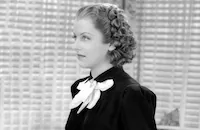Mama Steps Out

Brief Synopsis
Cast & Crew
George B. Seitz
Guy Kibbee
Alice Brady
Betty Furness
Stanley Morner
Gene Lockhart
Film Details
Technical Specs

Synopsis
The Cuppy family of Fort Wayne, Indiana go to France to "broaden" their cultural outlook, although father Leonard, a perfume manufacturer, and daughter Leila are not as enthusiastic as mother Ada. On the way to France, Leila sees Chuck Thompson, a singer on board their ship, whom she used to know, but he refuses to return her enthusiastic attempts to start a romance. Hoping to change his mind, Leila convinces her parents to take a Villa in Antibes, where Chuck is appearing with Ferdie Fisher's band, but still has difficulty in convincing him that he loves her, even though he calls her a sweet kid. Meanwhile, Ada is bored with staying at the villa and only meeting Americans. When a local priest comes asking for money to save his church, Ada asks him to introduce her to some "cultural" Europeans. To comply, he brings some local "artists" who irritate Leila and Leonard with their antics, but enthrall Ada. One night, as Leonard drowns his sorrows in French apperitifs, ordered by Ada in place of his beloved American soda pop, he orders Ada's new friends out. She is consoled by Coco, a Frenchman with whom she is having a flirtation. Later Leila goes to Chuck's room to give him a sweater that she has knitted for him and he kisses her, but tells her to leave and look for a nice guy to marry. When Leila returns home she interrupts Ada kissing Coco and disgustedly tells her mother that she is going to marry Chuck and go with him to Italy where the band will be appearing next. Leonard then catches Coco trying to rob his room and calls the police, who don't understand the situation and arrest him instead of Coco, as Ada and Coco go after Leila. In Italy, Chuck makes Leila get her own room, then, when he discovers her dining with Ferdie, who is a married man, he orders her back to her own room and starts a fight. In the melee, he accidentally knocks Leila unconscious, then takes her back to her room. Finally, Ada, Leonard, Ferdie, the American consul, and Mr. Sims, a wealthy American friend of Leonard's, all converge on Leila's room. Seeing Leila's black eye, they are all shocked, but Chuck says that he plans to marry Leila and work very hard to deserve her. Sims then offers Ferdie a radio contract, but only if Chuck remains the band's singer. Happy at last, Ada says that at least Leila has something to take home with her.

Director
George B. Seitz
Cast

Guy Kibbee

Alice Brady

Betty Furness

Stanley Morner

Gene Lockhart

Edward Norris

Gregory Gaye
Ivan Lebedeff
Heather Thatcher

Frank Puglia
Adrienne D'ambricourt
Sherry Hall

Charles Irwin
Francisco Maran
Jack Chefe
George Humbert
George Davis
Albert Morin
André Cheron
Jacques Vanaire
Albert Pollet

Fred Malatesta
Candy Candido
Dorothy Mccarthy And The Three Dots
Crew
George Boemler
John Detlie
John Emerson
Chet Forrest
Cedric Gibbons
Anita Loos
Jackson Rose
Douglas Shearer
Walter Strohm
Dolly Tree
Edward Ward
Edwin B. Willis
Bob Wright

Film Details
Technical Specs

Articles
Mama Steps Out
By Frank Miller

Mama Steps Out
Quotes
Trivia
The original play, "Ada Beats the Drum," opened in New York on 8 May 1930, with Mary Boland and George Barbier in the roles of Ada and Leonard Cuppy.
The original play, "Ada Beats the Drum," opened in New York on 8 May 1930, with Mary Boland and George Barbier in the roles of Ada and Leonard Cuppy.
Notes
The film's working title was Burnt Fingers. The Motion Picture Herald review lists a preview running time of 79 min. According to the Daily Variety review this film marked the "screen bow" of Stanley Morner (later known as Dennis Morgan). Although this was the first film on which Morner received onscreen credit, he had been seen previously in bit parts in other M-G-M films, including The Great Ziegfeld in 1936, in which he appeared in the "A Pretty Girl Is Like a Melody" number. Mary Boland and George Barbier played the roles of Ada and Leonard Cuppy on Broadway, and Boland recreated the role on a Lux Radio Theatre broadcast on April 28, 1935.















